新目标英语八年级上册Unit 5 Can you come to my party单元测试题
八年级英语上册 Unit5 Can you come to my party教案 人教新目标版
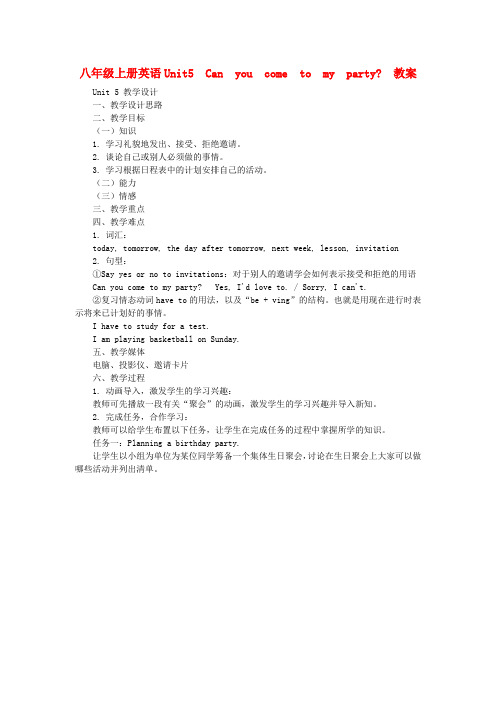
八年级上册英语Unit5 Can you come to my party? 教案Unit 5 教学设计一、教学设计思路二、教学目标(一)知识1. 学习礼貌地发出、接受、拒绝邀请。
2. 谈论自己或别人必须做的事情。
3. 学习根据日程表中的计划安排自己的活动。
(二)能力(三)情感三、教学重点四、教学难点1. 词汇:today, tomorrow, the day after tomorrow, next week, lesson, invitation2. 句型:①Say yes or no to invitations:对于别人的邀请学会如何表示接受和拒绝的用语Can you come to my party? Yes, I'd love to. / Sorry, I can't.②复习情态动词have to的用法,以及“be + ving”的结构。
也就是用现在进行时表示将来已计划好的事情。
I have to study for a test.I am playing basketball on Sunday.五、教学媒体电脑、投影仪、邀请卡片六、教学过程1. 动画导入,激发学生的学习兴趣:教师可先播放一段有关“聚会”的动画,激发学生的学习兴趣并导入新知。
2. 完成任务,合作学习:教师可以给学生布置以下任务,让学生在完成任务的过程中掌握所学的知识。
任务一:Planning a birthday party.让学生以小组为单位为某位同学筹备一个集体生日聚会,讨论在生日聚会上大家可以做哪些活动并列出清单。
新目标八年级英语上册Unit5 Can you come to my party?讲解与练习
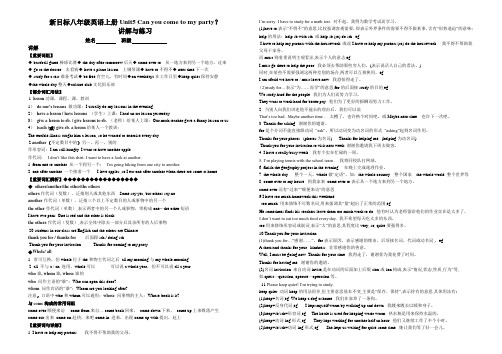
新目标八年级英语上册Unit5 Can you come to my party?讲解与练习姓名班级讲解【重要词组】◆ baseball game棒球比赛◆ the day after tomorrow后天◆ come over to从一地方来到另一个地方,过来◆ go to the doctor去看病◆ have a piano lesson上钢琴课◆ have to不得不◆ next time下一次◆ study for a test准备考试◆ be free有空儿,有时间◆on weekdays在工作日里◆keep quiet保持安静◆the whole day整天◆culture club文化俱乐部【部分词汇用法】1. lesson功课,课程,课,教训1). do one’s lessons做功课:I usually do my lessons in the evening.2). have a lesson / have lessons(学生)上课:I had an art lesson yesterday.3). give a lesson to sb. / give lessons to sb.(老师)给某人上课:Our math teacher gave a funny lesson to us. 4). teach (或) give sb. a lesson给某人一个教训:The terrible illness taught him a lesson, so he wanted to exercise every day.2.another(不定数目中的)另一,再一,别的作形容词:I am still hungry. I want to have another apple.作代词:I don’t like this shirt. I want to have a look at another.1. from one to another 从一个到另一个:I’m going hiking from one city to another.2. one after another 一个接着一个I love apples, so I eat one after another when there are some at home.【重要词汇辨析】◆◆◆◆◆◆◆◆◆◆◆◆◆◆◆◆◆◆others/another/the other/the othersothers作代词(复数),泛指别人或其他东西Some say yes, but others say no.another作代词(单数),泛指三个以上不定数目的人或事物中的另一个the other作代词(单数),表示两者中的另一个人或事物,常构成one…the other短语I have two pens. One is red and the other is black.the others作代词(复数),表示全体中除去一部分后其余所有的人后事物20 students in our class are English and the others are Chinese.thank you for / thanks for 后面跟sth./ doing sth.Thank you for your invitation. Thanks for coming to my party.◆Whole/ all1. 常可互换,但whole位于the和物主代词之后all my morning与my whole morning2. all 不与a / an 连用,whole可以可以说a whole year,但不可以说all a yearwho谁, whom谁, whose谁的who 问作主语的“谁”:Who can open this door?whom 问作宾语的“谁”:Whom are you looking after?注意:口语中who和whom可以通用;whose 问事物的主人:Whose book is it?与come构成的常用词组come over顺便来访come from来自… come back回来,come down下来,come up上来败落产生come out出来come on赶快,来吧come in 进来,出现 come up with提出,赶上【重要词句详解】1.I have to help my parents . 我不得不帮助我的父母。
新目标英语八年级上Unit5Canyoucometomypar

新目标英语八年级上Unit 5 Can you come to my partySection A教案I. Teaching goals(教学目标):1.Knowledge goal(知识目标):a. learn and master some key words and sentence patterns: :have a piano lesson concert another invitation study for a test Thanks for doing That’ too bad .2.Ability goal(能力目标):a. Go on improving student’s listening and reading b. Learn to master accept and decline invitations.3.Emotion goal(情感态度目标): Talking about duty and obligations (谈论责任和义务)II .Teaching importance and difficulty(教学重难点):How to make invitations , accept and decline invitations and reasons .III.Teaching design教学设计:Pass through “ Can you come to my party? ” this sentence pattern, let Ss master some key words and accept and decline invitations two goals, and talking about duty and obligations this emotion goal.IV. Teaching ladder (教学步骤):Step 1 RevisionRevise: A: Can you sing a song ? B Yes ,I can./ No, I can’t…..Let the students ask this question one by one.Step 2 PresentationLook at the expressions on t he screen : Sure, I’d love to. I’m sorry, Ihave to ______.Read the expressions to the class and the students to repeat each one .Say ,can you come to my party ? Have the number 1student give yes answers and number2 s give no answers plus a reason .Ask students to give their own reasons. If necessary, I can give a reason and have the students repeat it .Step 3 This activity introduces the key vocabulary1. Focus attention on the screen. Ask students to tell what see in each scene.2. Point out the blank next to each of the phrases .Ask students to write the letter of the correct picture in this blank3. Point out the simple answer. Ask students to fill in the blanks individually.4.Check the answers : 1 b 2 c 3 d 4e 5aStep 4 Listening1. Play the recording for the first time .Students only listen2. play the recording a second time .point to the picturesWrite the name of each person next to his or her picture3. Check the answersStep 5 Groupwork1. Help students form groups of four .say ,one of you is student A .Student A invite the other three students to your party. The other students say yes or no Remember to give a reason2. Have the students work in groupsStep 6 ReadingLook at the screen . Let the students read the passages. The girls read A .The boys Read B Step 7 PairworkLook at the pictures on the screen .Let the students do pairworkStep 8 ExercisesTranslate some sentences and phrases into English1)那太糟糕了。
新目标英语八年级上Unit 5 Can you come to my party教案

新目标英语八年级上Unit 5 Can you come to my party一、单元目标与要求❶能够用can这个句型学会邀请别人以及回答,如Can you come to my party ?Sure, I’d love to . Sorry ,I can’t . I have to ….❷能够充分理解情态动词can的用法,如can 表示“能力”,“许可”,“可能性”❸能听、说、读、写本单元的重点词汇,如lesson,another,concert,whom,tomorrow,weekday,training,chemistry,american,match,whole,over, free等单词和重点句型,如Can you go to the mall this week ?Can she/he/they go to movies ?。
❹掌握SectionA的内容并根据要求灵活地自编对话。
能够听懂简单的听力回答,完成填写部分的练习。
❺了解Section B部分内容,并能解决相应的问题。
通过本单元的学习能引导学培养学生礼貌用语的习惯,学会写请贴,会制做日程表,学会人际交往的基本常识,如何接受和拒绝别人的邀请。
二、课时安排4课时第一课时:Section A:1a , 1b ,1c ,2a ,2b.第二课时:Section A : 3a , 3b , 4第三课时:Section B (1a—2c; 4)第四课时:Section B (3a—3c) Selfcheck (1and 2)Period 1●教学内容与分析❶教学内容:Section A:1a , 1b ,1c ,2a ,2b.❷教学目标:a. vocabubary: lesson , hey , baseball game ,test , piano , guitar , aunt , concert , partyb.Patterns: Can you come to my party ?Sure, I’d love to .Sorry ,I can’t . I have to …c.能力目标:学会邀请别人以及回答的方式.d.情感目标:培养学生礼貌用语的习惯.。
新人教版新目标初中英语八年级上册《Unit 5 Can you come to my party 》教案
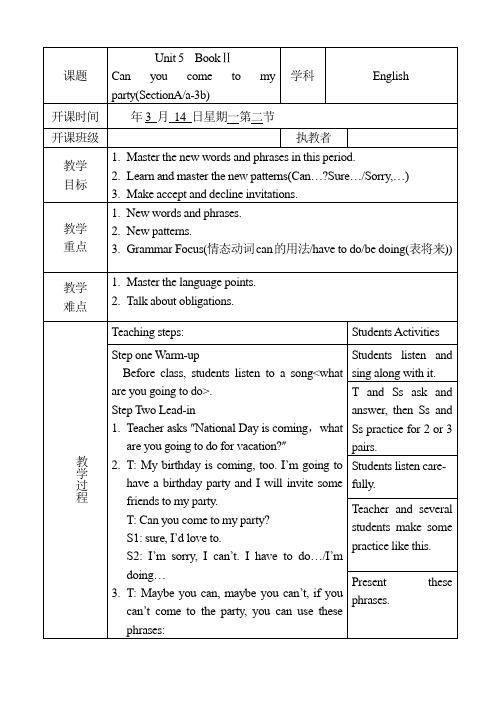
课题Unit 5 BookⅡCan you come to myparty(SectionA/a-3b)学科English开课时间年3 月14 日星期一第二节开课班级执教者教学目标1.Master the new words and phrases in this period.2.Learn and master the new patterns(Can…?Sure…/Sorry,…)3.Make accept and decline invitations.教学重点1.New words and phrases.2.New patterns.3.Grammar Focus(情态动词can的用法/have to do/be doing(表将来))教学难点1.Master the language points.2.Talk about obligations.教学过程Teaching steps: Students Activities Step one Warm-upBefore class, students listen to a song<whatare you going to do>.Step Two Lead-in1.Teacher asks ″National Day is coming,whatare you going to do for vacation?″2.T: My birthday is coming, too. I’m going tohave a birthday party and I will invite somefriends to my party.T: Can you come to my party?S1: sure, I’d love to.S2: I’m sorry, I can’t. I have to do…/I’mdoing…3.T: Maybe you can, maybe you can’t, if youcan’t come to the party, you can use thesephrases:Students listen andsing along with it.T and Ss ask andanswer, then Ss andSs practice for 2 or 3pairs.Students listen care-fully.Teacher and severalstudents make somepractice like this.Present thesephrases.1>have a piano lesson2>study for a test2>help my parents 4>go to the doctor.5>visit my aunt 6>go to a concert.Step Three Practice1.T: Suppose you are going to have a birthdayparty and want to invite some good friends.Practice in pairs and you can use the six phrases.2.Students practice in pairs to practice thenew patterns. Then check some pairs. Step Four Listening and Practice1.Anna’s birthday is coming too, she’s goingto have a birthday party and invite some of her good friends to her party.1>Can they come to the party?Listen and fill in the chart by themselves. Students read them after the teacher and pay attention to the new words. Students work in pairs to practice. Then check some pairs.Students listen to the tape and fill in the blanks with “can’t/can”Name Can’t/can Reasons(原因)JeffMaryMayClaudiaPaul2.Check the answers on by one.3.Listen again and answer: Why can’t theycome to the party?4.Then check the answers carefully one byone.5.(S)Let’s make a report according to thechart.The beginning likes this: After listening, then check the answers one by one.Students listen again and fill in the blanks with the reasons.Students say out the reasons教学过程Sample: A ReportAnna’s birthday is coming, she is going tohave a party and she’ll invite some of her friendsto come to her party. But Jeff can’t come to heparty, because…6. Then check some students’ reports.Step Five Read and LearnSB Page 27. 3a and 3b.Birthday InvitationIt’s a Birthday Party!For whom: LisaTime: Friday, June 30, at four thirty.Place: Lisa’s house, 15th Street.Come and have fun!Lisa: Hi, Simon,you come to my?Simon: is it?Lisa: It’sat.Simon: Great! I’d love to.Students make areport according tothe chart.Check somestudentsAsk students to readthis invitation care-Fully and completethe conversation.Then check theanswers to them oneby one.6.Read and complete the conversationcarefully.7.Check the answers one by one and practicein pairs.Practice it in pairs.Students design theirown cards bythemselves.Students practice thebirthday cards withthe partner.8.Design your own Birthday Invitationaccording to 3a.Birthday InvitationIt’s a !For whom: .Time: .Place: .Come and have fun! Students do some consolidation exercises to consolidate some language points in this period.教学反思9.Then practice in pairs with your partner totalk about your birthday card.Step Six ConsolidationSome consolidation exercises:3.I can’t go to movies. I have to my piano l.4.Sorry, I can’t go to your party, maybe atime.3. They are having a cnext week.4.-Can you (come) to my party, please?-Sorry, I have to(study) for a test.5. Thanks for(ask) us!Two students writethe answers on theBb, the others writeon their exercisebooks.Check the answerscarefully one byone.First ask students tosum up bythemselves, then theteacher adds some.教学过程6.I’m(go) to the movies this Sunday.7. I’d love(come) over to your house to see your parents.8. Whatyou(do) this Sunday? Are you free?9. Lucy can’t(swim). She is too young.10.-Oh, it’s time to have the English party.-(come) and have fun.Step Seven Sum upThis class we have learn:1>word: e.g. concert, lesson, another, whom,2>Some Phrases: have a piano lesson…..3>new patterns:-can you….? (发出邀请)-Sure, I’d love to. (接受邀请)I have to do…-Sorry, I can’t. ﹛I’ m doing…(拒绝邀请)4.Grammars:1) have to do2) be doing sth. (现在进行时表示将来)* “Families and fiends are the biggest happiness for every one!”*教学反思本节课主要以过生日举行生日聚会为主题展开听、说、读等各项活动,一开始由国庆节快到了,引出你将要做什么这一话题,后到我的生日快到了,我将要举办一个生日聚会--邀请朋友到聚会上来--Anna的生日聚会(进行听、说练习)--读Lisa的生日邀请函并做对话--设制自己的生日邀请函并和搭档做练习对话--做相应的巩固练习题--总结本节课的学习内--情感升华--家人和朋友对每个人来说是最大的幸福和快乐!。
八年级英语上册 Unit 5 Can you come to my party教材全梳理 人教新目标
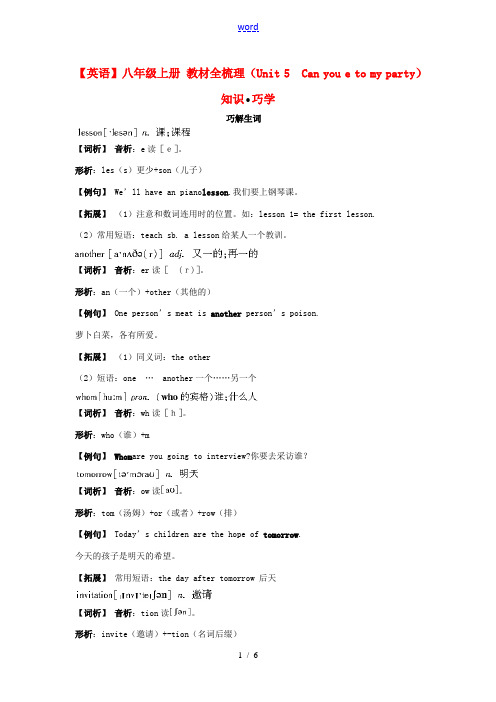
【英语】八年级上册教材全梳理(Unit 5 Can you e to my party)知识•巧学巧解生词【词析】音析:e读[e]。
形析:les(s)更少+son(儿子)【例句】We’ll have an piano lesson.我们要上钢琴课。
【拓展】(1)注意和数词连用时的位置。
如:lesson 1= the first lesson.(2)常用短语:teach sb. a lesson给某人一个教训。
【词析】音析:er读[(r)]。
形析:an(一个)+other(其他的)【例句】One person’s meat is another person’s poison.萝卜白菜,各有所爱。
【拓展】(1)同义词:the other(2)短语:one…another一个……另一个【词析】音析:wh读[h]。
形析:who(谁)+m【例句】 Whom are you going to interview?你要去采访谁?【词析】音析:ow读。
形析:tom(汤姆)+or(或者)+row(排)【例句】Today’s children are the hope of tomorrow.今天的孩子是明天的希望。
【拓展】常用短语:the day after tomorrow 后天【词析】音析:tion读。
形析:invite(邀请)+-tion(名词后缀)【例句】 Thanks for your invitation! 谢谢你的邀请!【拓展】(1)同根词:invite(2)常用短语:a letter of invitation 一封邀请信【词析】音析:i读[I]。
形析:形近词city【例句】It’s a pity that you did not e.很遗憾你没来。
【拓展】(1)惯用法:What a pity!真遗憾!(2)短语:feel pity for sb. 同情某人;out of pity出于同情【词析】音析:o读。
八年级英语上册 unit 5 can you come to my party重难点解析 人教新目标版
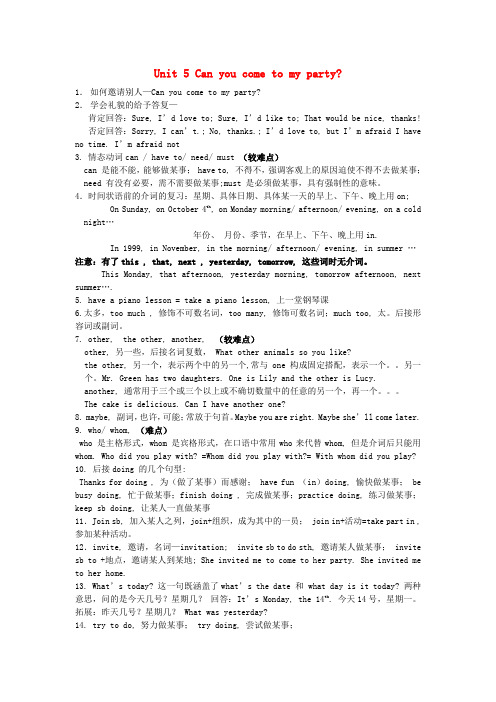
Unit 5 Can you come to my party?1.如何邀请别人—Can you come to my party?2.学会礼貌的给予答复—肯定回答:Sure, I’d love to; Sure, I’d like to; That would be nice, thanks!否定回答:Sorry, I can’t.; No, thanks.; I’d love to, but I’m afraid I have no time. I’m afraid not3. 情态动词can / have to/ need/ must (较难点)can 是能不能,能够做某事; have to, 不得不,强调客观上的原因迫使不得不去做某事;need 有没有必要,需不需要做某事;must 是必须做某事,具有强制性的意味。
4.时间状语前的介词的复习:星期、具体日期、具体某一天的早上、下午、晚上用on;On Sunday, on October 4th, on Monday morning/ afternoon/ evening, on a cold night…年份、月份、季节,在早上、下午、晚上用in.In 1999, in November, in the morning/ afternoon/ evening, in summer …注意:有了this , that, next , yesterday, tomorrow, 这些词时无介词。
This Monday, that afternoon, yesterday morning, tomorrow afternoon, next summer….5. have a piano lesson = take a piano lesson, 上一堂钢琴课6.太多,too much , 修饰不可数名词,too many, 修饰可数名词;much too, 太。
八年级英语上册 Unit 5 Can you come to my party教案 人教新目标版
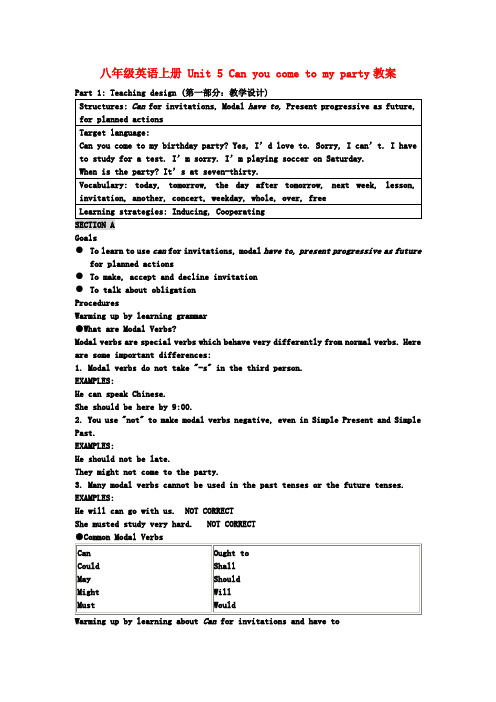
八年级英语上册 Unit 5 Can you come to my party教案Goals●To learn to use can for invitations, modal have to,present progressive as futurefor planned actions●To make, accept and decline invitation●To talk about obligationProceduresWarming up by learning grammar●What are Modal Verbs?Modal verbs are special verbs which behave very differently from normal verbs. Here are some important differences:1. Modal verbs do not take "-s" in the third person.EXAMPLES:He can speak Chinese.She should be here by 9:00.2. You use "not" to make modal verbs negative, even in Simple Present and Simple Past.EXAMPLES:He should not be late.They might not come to the party.3. Many modal verbs cannot be used in the past tenses or the future tenses. EXAMPLES:He will can go with us. NOT CORRECTShe musted study very hard. NOT CORRECTWarming up by learning about Can for invitations and have toWarming up by talking about the partyHello, everyone!Today we shall take up unit 5. The title of this unit is that Can you come to my party?Do you like parties? I think most of you will say,” Yeah”. At the party we have lots of fun eating, drinking, singing, dancing and talking. And we can also make new friends. But how do you answer when someone asks you to take part in a party? If you want to go to the party,you can say,”Sure, I’d love to.”If you have to do some other things at the same time, you can say,“I’m sorry.I have to -----.”Please look at the blackboard and read after me the target language for this unit. When you read, pay attention to the structure of the sentence.time it is offered. In such places people usually thank the person but do not givea definite answer at that time. But in the United States it is polite to accept or refuse an invitation the first time it is offered. Also, Americans usually give a reason when they have to say no to an invitation.1A: Matching the words with the picturesPlease look at the picture on page 25. The boy in the middle will hold a party. Can everyone come to the party? Each thought bubble shows a person doing something. Please tell me what you see in each scene. And then look at the blackboard and checkPlease read these phrases loudly. Now write letters of the correct picture in the1b Listening and writingYou are great! As you see, there are some people in the picture. Do you know who’s who? Now please listen to the conversation. Especially listen to Sun Ning’s words carefully. He says the names of each person he is inviting. When I play the recording for the first time, you just listen carefully. When I play the recording for the second time, please write the names of each person next to his or her picture. YouTapescriptmodal have to and present progressive as future, for planned actions.1c Practicing oral English using the languageNow please make your own dialogues in groups of four. Suppose you are the students in the picture. One of you is students A inviting the other three students to your party. The other students are B, C and D, saying if you can go or not. If you can’t go, remember to give a reason.offer vocabulary and pronunciation support if you need.2a Listening and understandingNow let’s go to page 26. Please look at these five sentences, and read them. The first time say can and the second time say can’t.Do you know which one is correct? Let’s listen to the tape. There are five conversations numbered 1 to 5. In each conversation the person says he can or he can’t come to the party. Listen to each conversation carefully and circle the word that makes the sentences correct. For example, the word can’t have a circle around it in sentence1. So sentence1 is Jeff can’t come to the party. I will play the recording twice. First time you just listen carefully and the second time please circle can or can’t.2b Listening and numberingYou have heard the conversations twice and have got to know who can come to the party and who can’t come to the party. But why can’t those three persons come? Here are five reasons. Which are correct ones? Please listen to the tape again and write the number of the conversation (1 to 3) in front of the reasons. Two of them are not in the recording. These two have no answer. Listen again and check your answers.Now from 2b we come to know the reasons why people can’t come to the party. Thinkwork with your partner. One of you is student A and one of you is student B. Student A, invite your partner to do something with you. Student B, say you can’t do it and give a reason. Then switch roles.3a Reading the article and filling the blanksPlease look at 3a. There is an invitation here. What kind of invitation is it? Who is having a birthday party? Good, you are great. Now look at the dialogue and tryplease pay attention to the pronunciation and intonation. Then please read together loudly.3b Doing pairworkNow practice the conversation you just completed with your partner. You should each have a turn being Simon. Now look at the blank invitation card and please think of any other events, such as music concert, art festival, and so on. You can fill out the cards with your own ideas.Then you can invite each other to your events.Read the sample dialogue and shadow the can for invitations, modal have to and present progressive as future, for planned actions.Then I will ask some pairs to present your conversations to the class.4 Inviting a friendNow let’s play a game in pairs. You and your partner decide who is A and who isB. Student A, you are Elisa, and look at this page. Student B, you are Lu Qing andlook at page 82. Elisa will invite Lu Qing to go to the mall. Read the sample dialoguetogether. Then look at the calendar and ask more questions to learn when they bothcan go to the mall. Find a time when they are both not busy. You can use the dialogueHow do you make, accept and decline invitations?You can make, accept and decline invitations as follows:*Can you come to my party?*Sure, I’d love to.*Sorry, I can’t. I’m going to the concert.*I’m sorry, I can’t, either. I have to go to the doctor.SECTION BGoals●To revise the days of the week●To learn the new words: today, tomorrow, the day after tomorrowProcedures1aWriting the datesWelcome back to the English class. Do you know what day is it today? Yes, it isWednesday today. And today we will study Section B. Please look at the top of thecalendar in your book and read these words aloud. Do you remember them?(Sunday, Monday, Tuesday, Wednesday,Thursday, Friday, Saturday) Good! Look at the blackboard please. Here is a current calendar. Mary, please pointout today’s date. Yes, it’s 12th October. What about the other dates of this week?Now please copy these numbers into the calendar in your books. Let’s see who canget the right answer.Then I’ll ask some of you to read each day’s date to the class. The sample is: It’s Sunday, the 9th.1b Writing daysPlease look at the calendar again. As you see, today is Wednesday the 12th. LookRead these words loudly and write them in the correct spaces on the calendar inI’ll ask a student to fill in the blank on the board and the rest of you can check your answers against those on the board.1c Doing pairwork and playing gamesNow look at the dialogue in 1c. Tom and Tim please read it to the class aloud. Then make the similar dialogue in pairs. One student points to a date and asks,What’s today? The other one answers, It’s (Monday) the (10th).After finishing practicing, let’s play the game of speed. Please look at the calendar on the board and listen carefully. When I point to a date on the calendar and say yesterday, today and tomorrow, I’ll say a student’s name. This student has to respond within five seconds with the correct date. For example, if I say (yesterday) and point to (Wednesday, the 12th) this student has to say, (It’s Tuesday, the 11th). Now let’s play this game and see how fast you can respond with correct answers. Let’s find who the champion is.2a Listening and circlingLook at the picture on page28. Please tell me what you see in the picture. And what is the boy doing? Yes, he’s talking on the phone. He’s talking to Vince. Can Vince play tennis with Andy? Let’s listen to the tape. I’ll play the recording twice. When I play the first time, you just listen carefully. When I play the second time, circle yes if Vince can play with Andy or circle no if Vince can’t.The answer is: NOmodal have to and present progressive as future, for planned actions.2b Listening and writingNow you have known Vince can’t play tennis with Andy, and he is very busy these days. What is Vince going to do on these days? Please look at the chart in your book. Here are Vince’s activities, and three letters a, b, c stand for today, tomorrow and the day after tomorrow. Listen to the tape again. This time please write the letters a, b or c in front of each activity to show which one happens today, which one happens tomorrow and which one happens the day after tomorrow. The sample answer is given. Number 1 is b. That means Vince is playing soccer tomorrow.2c Doing pairworkNow practice the dialogue in pairs. One student plays Andy and asks Vince to play tennis. The other one plays Vince, says no and gives reasons. I’ll give you a few minutes to practice, and then I’ll ask som e pairs to present the conversations3a Reading and writingLook at 3a please. Here is an e-mail message from Sonia. Read it aloud. When you are reading , please pay attention to the pronunciation and intonation.Read the e-mail message a second time to slash / the sentences, underline the expressions and shaow the c an for invitations, modal have to and present progressiveNow look at the blank calendar, there are seven days of the week. What happens on each day? Read the message again and complete Sonia’s calendar. Let’s check the3b Reading and writingHere is another e-mail message from Tony to Henry. Read it and help him completeNow write your own e-mail message to a friend. You are telling why you can’t visithim next week. You can give any reasons you wish. After you finish writing, I’ll ask some of you students to read your messages to the class.4 Closing up by doing groupworkPlease turn to page 83 and look at the calendar. What are you doing on Monday? Tuesday? … Now write down all the things you have to do next week. Then look at your list. On what day are you free? This is when you can have your party. Next ask your partners in your groups if they can come to your party at the time youNow let’s ask some students to tell us when their party is and if the classmates they invited can come to their party.SELF CHECKGoals:●To revise the key words of this unit●To practice writing1Filling the blanksFill in the blanks with the words given. Change the form of the word if necessary.2 Imaging and writingImagine you are Marie. Read the invitations on page 30 and look at your schedule if you can attend these activities. And then write replies to the invitations. ▲I’m sorry, Rose. I can’t play tennis with you because I’ll go fishing with grandpa the whole day on Saturday.▲Sorry, Julie. I’ll finish the geography project on Monday evening. So I can’t go to your party.▲Sorry, Dave. On Thursday evening I have a piano lesson. Can we discuss it on Friday?Just for fun!Sing a song in English:Are you sleeping?Are you sleeping, are you sleeping?brother John, brother John?Morning bells are ringing, morning bells are ringingding ding dong, ding ding dongPart2: Teaching Resources(第二部分:教学资源)I. Background readingsAmerican Holidays and Observances1. anotheradj. 1. 再一;再 one more: Here comes another bus. 又来了一辆公共汽车。
八年级英语上册 Unit5《Can you come to my party》文字素材1 人教新目标版
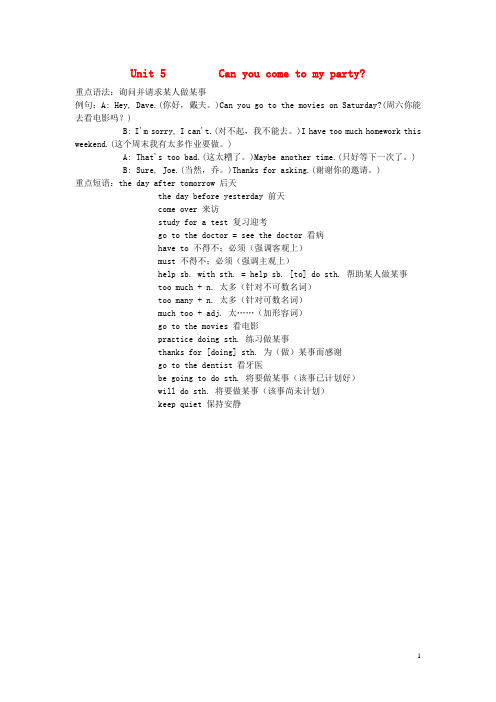
Unit 5 Can you come to my party?重点语法:询问并请求某人做某事例句:A: Hey, Dave.(你好,戴夫。
)Can you go to the movies on Saturday?(周六你能去看电影吗?)B: I'm sorry, I can't.(对不起,我不能去。
)I have too much homework this weekend.(这个周末我有太多作业要做。
)A: That's too bad.(这太糟了。
)Maybe another time.(只好等下一次了。
)B: Sure, Joe.(当然,乔。
)Thanks for asking.(谢谢你的邀请。
)重点短语:the day after tomorrow 后天the day before yesterday 前天come over 来访study for a test 复习迎考go to the doctor = see the doctor 看病have to 不得不;必须(强调客观上)must 不得不;必须(强调主观上)help sb. with sth. = help sb. [to] do sth. 帮助某人做某事too much + n. 太多(针对不可数名词)too many + n. 太多(针对可数名词)much too + adj. 太……(加形容词)go to the movies 看电影practice doing sth. 练习做某事thanks for [doing] sth. 为(做)某事而感谢go to the dentist 看牙医be going to do sth. 将要做某事(该事已计划好)will do sth. 将要做某事(该事尚未计划)keep quiet 保持安静1。
八年级英语上册 unit 5 can you come to my party知识点总结 人教新目标版
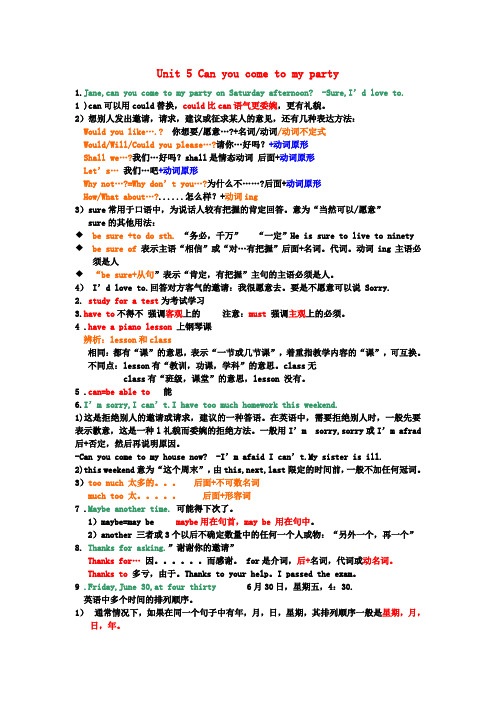
Unit 5 Can you come to my party1.Jane,can you come to my party on Saturday afternoon? -Sure,I’d love to.1 )can可以用could替换,could比can语气更委婉,更有礼貌。
2)想别人发出邀请,请求,建议或征求某人的意见,还有几种表达方法:Would you like….?你想要/愿意…?+名词/动词/动词不定式Would/Will/Could you please…?请你…好吗?+动词原形Shall we…?我们…好吗?shall是情态动词后面+动词原形Let’s… 我们…吧+动词原形Why not…?=Why don’t you…?为什么不……?后面+动词原形How/What about…?......怎么样?+动词ing3)sure常用于口语中,为说话人较有把握的肯定回答。
意为“当然可以/愿意”sure的其他用法:◆be sure +to do sth. “务必,千万” “一定”He is sure to live to ninety◆be sure of 表示主语“相信”或“对…有把握”后面+名词。
代词。
动词ing主语必须是人◆“be sure+从句”表示“肯定,有把握”主句的主语必须是人。
4)I’d love to.回答对方客气的邀请:我很愿意去。
要是不愿意可以说 Sorry.2. study for a test为考试学习3.have to不得不强调客观上的注意:must强调主观上的必须。
4 .have a piano lesson 上钢琴课辨析:lesson和class相同:都有“课”的意思,表示“一节或几节课”,着重指教学内容的“课”,可互换。
不同点:lesson有“教训,功课,学科”的意思。
class无class有“班级,课堂”的意思,lesson 没有。
5 .can=be able to 能6.I’m sorry,I can’t.I have too much homework this weekend.1)这是拒绝别人的邀请或请求,建议的一种答语。
新目标英语八年级上Unit 5 Can you come to my party教案

Unit 5 Can you come to my party?Teaching aims and demandsCan you come to my birthday party?Yes, I’d love to.Sorry, I can’t. I have to study for a test.I’m sorry. I’m playing soccer on Saturday.When is the party?It’s at seven-thirty.Teaching importance and difficultyMake, accept and decline invitation.Talk about obligation.Teaching waysRevision, Learning, Practice and Reading.Teaching toolsTape-recorderTeaching timeSeven periodsThe 30th periodTeaching contents: Section A 1a-1c P25Teaching Procedures:Step I Greet the class as usual and studying words on Page 24.Step II Section AT: Can you come to my party?Show these expressions the blackboard. Read the expression to the class and ask the students to repeat each one.S: I’d love to … I’m sorry , I have to …Step III 1aRead after me:Help his parents study for a testGo to the doctor babysitHave a piano lessonThen ask students to write the letter of the correct picture in the blank next to each of the pharses. Step IV 1bLet the students to complete the activity individually.Listen carefully.Ask students to complete the activity individually.Then correct the answers.Step V 1c GroupworkFirst let four students read the example in the speech bubbles to the class.Then help students form groups of four.Step VI An Optional ActivityAsk students to practice some invitation and refusals. Play the recordings for the class and have a student ask about any wordsor sentences they can’t understand.Step VIII Culture NoteIn some cultures, it is not considered polite to accept an invitation the first time it is offered. In such places people usually thank the people but do not give a definite answer at that time.Step IX Summary and HomeworkThis class we’ve learnt some key vocabulary and the target language. After class ask write the phrases in 1a down in your exercise books.The 31st periodTeaching contents: Section A 2a-2c P26Teaching Procedures:1.Words on Page 26 studying.2.SB Page 26, 2a .Point to the five sentences .Say ,listen to each conversation and then circle the word that makes the sentences correct .Play the recording .Check the answers .3.SB Page 26 ,2b .Call attention to the five sentences in activity 2a ,ask a student to read these sentences to the class saying the correct word “can” or “can’t” .Say ,now listen to the recording again .Write the number of the conversation (1 through 3) in front of the reasons .Play the recording .Write down these answers .Check the answers .4.Post-task SB Page 26 ,2c .Call attention to the points listed in activity 2b .Language points1)Thanks for asking. Ask sb to do sth2)Another + n.(c, sing.)Ask students to make their own conversation like the example .As students work ,move around the room and monitor .Ask some students to present their dialogue .5.HomeworkPractice :Invite your friends to come to your party .Write down their answers .The 32nd periodTeaching contents: Section A 3a-4 P27Teaching Procedures:Step 1 Leading inAsk :How many people did you invite yesterday ?What did they say ?Ask one student to show his answer .Step 2 Pre-taskSB Page 26 , Grammar focus .Review the grammar box .Ask Ss to say the questions and answers .Talk about the two ways people give reasons for saying no to an invitation .Call attention to “has to” and “have to” ,under the words write “I’m ing , and she’s ing .”Step 3 While-taskSB Page 27 , 3a .Call attention to the invitation .Ask questions about it .eg.What kind of invitation is it ?Call attention to the dialogue .Ask a pair of students to read it to the class ,saying blank each time they come to a blank line .Ask students to fill in the blanks according to the invitation .Check the answers .SB Page 27 , 3b .Ask two students to act the conversation you just completed .Call attention to the blank invitation card .Complete this card .Ask some pairs to present their conversations to the class .Step 4 Post-taskSB Page 27 ,Part 4 .Read the instructions for this activity to the class .Read the dialogue with a student .Point out Eliza’s calendar on page 27 and Lu Qing’s calendar on Page 87.Ask students to make conversations.Discuss the answer with the class .Step 5 Homework1.Make your own calendar .2.Make an invitation .The 33rd 34th periodsTeaching contents: Section B 1a-2c P28Teaching Procedures:Step 1 Word on P28 studying.Step 2 Pre-task SB Page 28 ,1a , 1b .Show the days of the week in a large monthly calendar .Point out the days of the week at the top of the calendar and ask a student to read these words aloud .Ask a student to point out today’s date ,tomorrow’s date ,the day after tomorrow’s date and yesterday’s dateComplete activity 1a ,check the answer .Ask students to write the words today ,tomorrow , yesterday and the day after tomorrow in the correct spaces on the calendars in their books .Step 3 While-task SB Page 28, 1c .Call attention to the example in the box .Ask two students to read it to the class .Explain :1)What’s today ? = what day is (it) today ? --- Today is Friday./It’s Friday today.2)What’s the date today? – Today6 is Oct 12,2009.3)It’s Friday, October 12 at ten-forty.Ask Ss to work in pairs .Ask :What do you want to do on Monday , Tuesday … ?Write down your answers .Make some conversations with your partner .Ask some Ss to present their conversations .SB Page 28, 2a, 2b .Point to the picture .Listen to the conversation .Can Vince play tennis with Andy ?Circle “yes” or “no” .Play the recording .Ask what can Vince do today .Pay attention to the list of five activities ,and the three lettered words .Point out the sample answer ,say, Number 1 is b ,that means that Vince is playing soccer tomorrow .Play the recording .Correct the answers .Step 4 Post-taskSB Page 28, 2c .Help student find partners .Say ,one student is Andy ,the other is Vince .Ask the pairs to practice for a few minutes like the example.Ask some pairs to present their conversation .The 35th 36th periodsTeaching contents: Section B 3a-4 P29Teaching Procedures:Step 1 words on P29 studying.Step 2 Leading inShow an article to the class .Say ,this is a e-mail message .Call attention to the form .Read the article individually .Step 3 Pre-task SB Page 29 ,3a .Say ,there is another e-mail message .Ask a student to read it to the class .Call attention to the blank calendar .Say ,Now read it again .Then complete Sonia’s calendar .Check the answers .Language points : thanks for your invitation / asking me. /inviting me.Step 4 While-task SB Page 29 ,3b .Point out the e-mail message .Ask a student to read it aloud .Say ,Fill in the blanks in the e-mail message ,use “I’m+verb+ing” or “I have to +verb”.Ask students to complete the activity on their own .Ask some Ss to present the answers to the class .SB Page 29 ,3c .Say ,now write your own e-mail message to a friend .say why you can’t visit next week , give some reasons you wish .As Ss work ,move around the room monitoring their work.Ask some Ss to read their message to the class .Step 5 Post-taskSB Page 29 ,Part 4 .Read the instruction to the class.Complete the calendar on Page 88 .Say ,now go around the class .Ask Ss if they can come to your party at the time you are free . Step 6 ExerciseThe 37th periodTeaching contents: Self checkTeaching Procedures:Step I Greet the class as usual and check the homework.Step IIShow some new words on the blackboard.Read the words to the class and ask students to repeat. Make sure everyone understands its meaning.Step III Self check 1Ask students to fill in the blanks on their own.Check the answers:Step IV 2Ask students to read the invitation.Language point :1).on TV on the phone / Internet2). The whole day = all day the whole + n.( c, sing.) all + 限定词+ n. ( c , pl; u)The whole country = all the countryAll his money (the whole money ×)3). Cover over to4). Be free = have time ←→be busy be busy doing sth5). Till untilI’ll wait for him till / until 6:00 pm.We didn’t go home till / until 6:00 pm.Imagine you are Marie. Look at your schedule. Write replies to the invitations.Tell Rose, Julie, walk around the class offering language support where necessary.Step V Just for Fun!Ask students to read the cartoon to themselves.Then have two students read the words to the class.Help students understand that it’s the famous musician, Beethoven, who has to practice the piano.Step VI Read about Meimei and JudyJudy is coming t o the party. She wants to help Meimei on Saturday, but she can’t. She has a soccer game in the morning. And in the afternoon, she’s going to her uncle’s house. She’s coming to the party at 8:00.Step VII SummaryToday we’ve reviewed the key vocabulary and the target of the unit by reading and writing. Step VIII HomeworkFinish off the exercise of workbook.。
新目标英语八年级上Unit 5 Can you come to
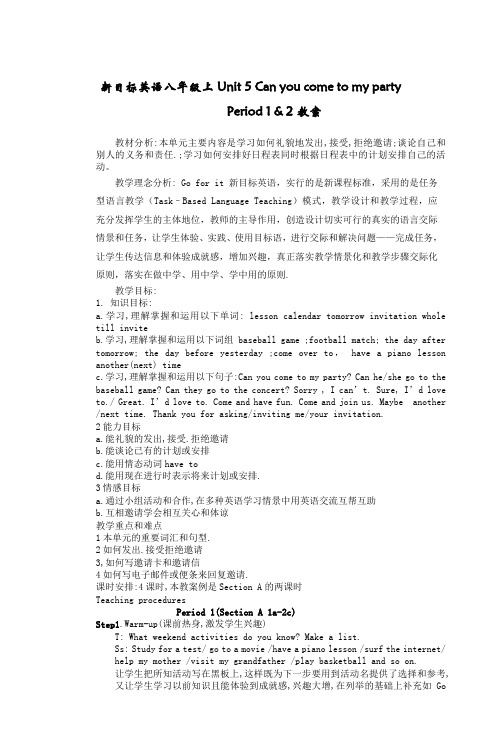
新目标英语八年级上Unit 5 Can you come to my partyPeriod 1 & 2教案教材分析:本单元主要内容是学习如何礼貌地发出,接受,拒绝邀请;谈论自己和别人的义务和责任.;学习如何安排好日程表同时根据日程表中的计划安排自己的活动。
教学理念分析: Go for it 新目标英语,实行的是新课程标准,采用的是任务型语言教学(Task–Based Language Teaching)模式,教学设计和教学过程,应充分发挥学生的主体地位,教师的主导作用,创造设计切实可行的真实的语言交际情景和任务,让学生体验、实践、使用目标语,进行交际和解决问题——完成任务,让学生传达信息和体验成就感,增加兴趣,真正落实教学情景化和教学步骤交际化原则,落实在做中学、用中学、学中用的原则.教学目标:1.知识目标:a.学习,理解掌握和运用以下单词: lesson calendar tomorrow invitation whole till inviteb.学习,理解掌握和运用以下词组 baseball game ;football match; the day after tomorrow; the day before yesterday ;come over to,have a piano lesson another(next) timec.学习,理解掌握和运用以下句子:Can you come to my party? Can he/she go to the baseball game? Can they go to the concert? Sorry , I can’t. Sure, I’d love to./ Great. I’d love to. Come and have fun. Come and join us. Maybe another /next time. Thank you for asking/inviting me/your invitation.2能力目标a.能礼貌的发出,接受.拒绝邀请b.能谈论已有的计划或安排c.能用情态动词have tod.能用现在进行时表示将来计划或安排.3情感目标a.通过小组活动和合作,在多种英语学习情景中用英语交流互帮互助b.互相邀请学会相互关心和体谅教学重点和难点1本单元的重要词汇和句型.2如何发出.接受拒绝邀请3,如何写邀请卡和邀请信4如何写电子邮件或便条来回复邀请.课时安排:4课时,本教案例是Section A的两课时Teaching proceduresPeriod 1(Section A 1a-2c)Step1.Warm-up(课前热身,激发学生兴趣)T: What weekend activities do you know? Make a list.Ss: Study for a test/ go to a movie /have a piano lesson /surf the internet/ help my mother /visit my grandfather /play basketball and so on.让学生把所知活动写在黑板上,这样既为下一步要用到活动名提供了选择和参考,又让学生学习以前知识且能体验到成就感,兴趣大增,在列举的基础上补充如Goto the doctor /go to the baseball game/ have a guitar lesson等且写在黑板上.Step 2导入新课T; What activities do you want to do this weekend?S:I want to …T: What activities do you not want to do?S:I don’t want to study for a test/…T; Yes, you don’t like these activities but you have to do them.把句型You have to do something.写在黑板上,这样导入了表示拒绝的重点句型I have to…然后问学生是否能参加我的生日晚会(晚会时间各不相同有上课时,周末等)回答中必然有肯定和否定两种,帮助学生回答完整且把下列对话写在黑板上.A: Can you come to my party?B: Sure , I’d love to .Thanks for asking.Sorry I can’t. I have a piano lesson/have too much homework…I’m sorry , I can’t . I have to help my mother./go to the doctor.I’m sorry , I can’t. I’m playing soccer./going to the movies.这样表示拒绝的三种理由表达法都呈现出来了,.下一步学生就会使用以上三种句型来拒绝邀请.Step 3 Pairwork(2c)Task: Give and accept or decline invitations in pairs like2c.Then ask several pairs to act out their conversations.此任务是学以致用,利用以上所学来向对方提出或拒绝或接受邀请,这样一来学生在使用目标语中慢慢掌握了本节课重点内容.Step4 Groupwork当最后两组学生互相邀请时,随后问全班同学Can he /she come to his or her party ?Help them to answer .No he /she can’t. He /She has a football lesson /has to help her mother/is surfing the Internet. Then ask the class to ask and answer in threes to practice following conversations.A: Can you go to the movies?B: Sorry, I can’t . I have to go to the doctor.C: Can he go to the movies?A: No he can’t .He has to go to the doctor.通过练习会话,操练和掌握了第三人称的相关内容.Step5 Invitation and reportTask1: Invite five classmates to a concert.Task2: Report the result.假设马上有一个音乐会,六人为一组,一人邀请其余五人同去,然后汇报邀请结果,这样学中用,用中学既练习如何发出,接受和拒绝邀请,同时练习了用第三人称汇报邀请结果.Step6 ListeningTask: Listen to 1b,2a&2b and finish the exercises in them.在训练熟练的基础上再做听力,既能起到再次训练和巩固的作用,有能让学生体验到成功的喜悦,提高学习兴趣和听力。
新目标八年级上Unit_5_Can_you_come_to_my_party教案_Title_(题目_AqnwPq

新目标八年级上Unit 5 Can you come to my party教案Title (题目):Unit 5 Can you come to my party? Topic(主题):InvitationsTeaching aims (教学目标):1.Learn 10 important phrases.2.Can for invitation.e modal verb “have to”/4.V-ing shows action or plan in the future.Key and difficult points (重点难点):A.Vocabulary (词汇)help, today, tomorrow, lesson, whole, match, study for a test, have a piano lesson, help my parents, visit my aunt,play soccer, go to the doctor, baseball game, birthday party, go to the moviesB.Target Language (目标语言):1.Can you come to my party?Sure, I’d love to.2.Can you go to the movies?I’m sorry. I have to help my mom.3.Can he go to the baseball game?No, he can’t. She has to study for a test.4.Can they go to the concert?No, they can’t. They are going to a party. Structures(语言结构):1.用can 表示邀请2.情态动词have toFunctions (功能):Make, accept and decline invitations.Teaching aids (教具):多媒体、录音机Learning methods(学法):认知策略,交际策略,调控策略,资源策略Teaching procedures(教学过程):Step 1Lead-in: Show the teaching aims and the important phrases.Step 2Complete some sentences and then check the answers.• 1.I have to study A. a piano lesson at 3:00.• 2.You should B. my aunt.• 3.I have C. go to the doctor.• 4. I should help D. for a test.• 5. I have to visit E. my parents.Step 3Ask the students to look at the pictures and makeconversations.⏹Can you … ( with me)?⏹Sure, I’d love / like to. Thanks for asking.⏹Sorry, I can’t. I have to…Step 4Let the students listen to the tape and answer the following questions:Can Jeff come to the party? (No, he can’t)Can Mary come to the party? (Yes, she can)Can May come to the party? (No, she can’t)Can Claudia come to the party? (No, she can’t)Can Paul come to the party? (Yes, he can) Listen 2 times and choose some students to answer.Step 5Listen again and match the names with the reasons.Jeff _ B __May _A__Claudia _C_A. I have to help my mom.B. I have to visit my aunt.C.I’m going to the movies.Step 6Pairwork: Say, “You are going to have a party on Sunday afternoon. First, list your friends’ names you want to write. Next , go to invite them. Find out who can come, and who can’t come. Then fill in the chart.Step 7Daily exercises:对于别人的邀请,你可能有不同的原因和理由表示谢绝,记住下面的原因和理由,并且翻译成汉语。
八年级英语上册 Unit 5 Can you come to my party 人教新目标版

一、学习目标:1、知识目标:掌握本讲的词汇、短语和句型。
2、能力目标:能礼貌地发出、接受、拒绝邀请。
3、情感目标:通过本讲学习,培养学生礼貌待人的品质,学会交际技巧。
二、重点、难点:重点:单词another, busy, invitation, whole, till;短语thanks for, come over;句型Can you come to my party on Wednesday? Sure, I’d love to.难点:辨析another, other, the other, others, the others的区别;学会接受邀请与拒绝邀请的表达等。
三、知能提升:(一)重点单词[单词学习]◎another【用法】“另一个,再一个”。
通常用于三个以上或不确定数量中的任意一个人或物。
【例句】May I have another egg, please?【考查点】辨析:another, other, the other, others与the others○→○○●○○(one…another…)侧重在三个或三个以上的人或物中选择其中任何一个。
I don’t like this pair of shoes. Would you please show me another pair?○→●(one…the other…)表示只有两者的情况下,一个与另一个的关系。
I have two friends. One is a teacher and the other is a doctor.○→●●●(one…the others…)侧重列举多数人或物中的一个与其余全部。
They have four children. One is a girl, the others are boys.○○○→●●●●(some…the others…)列举多数人或物中的一部分和其余全部。
Some students are reading, the others are drawing pictures.○○○→○○●●●(some…others…)列举多数人或物中的一部分和另一部分中的一些(不是全部)。
- 1、下载文档前请自行甄别文档内容的完整性,平台不提供额外的编辑、内容补充、找答案等附加服务。
- 2、"仅部分预览"的文档,不可在线预览部分如存在完整性等问题,可反馈申请退款(可完整预览的文档不适用该条件!)。
- 3、如文档侵犯您的权益,请联系客服反馈,我们会尽快为您处理(人工客服工作时间:9:00-18:30)。
单元测试题听力测试略。
I. 单项选择(10分)()16. —______ you go to the mall with me this afternoon?—Sure, ______.A. Can; I can’tB. Can; I’d love toC. Are; I amD. Do; I do()17. I have to study ______ the history test ______ Thursday afternoon.A. at; onB. for; inC. at; inD. for; on()18. They can’t go to visit you because they ______ bike riding.A. goB. goingC. are goingD. went()19. Bill ______ come out to play because he _______ help his mom in the garden.A. can; have toB. can; has toC. can’t; have toD. can’t; has to()20. Did you make the dinner for your parents ______?A. yesterdayB. nowC. tomorrowD. next Friday()21. You have a cold. After taking the medicine, you’d better stay in bed ______ tomorrow.A. fromB. tillC. beforeD. after()22. In that school the students ______ the guitar lesson once a week.A. playB. studyC. haveD. give()23. I don’t like the color of this coat. Can you show me ______ one?A. otherB. othersC. the otherD. another()24. Thanks a lot for ______ me to your birthday party.A. inviteB. invitingC. sendD. sending()25. —Would you like to go to the museum with me?—______A. Why not come with me?B. I’d like to, but I have too many things to do.C. The same to you.D. Yes, please.II. 完形填空(10分)Dear Lucy,Thank you for your letter and your invitation. I really hope I can 26 with you. But I have to say 27 to you. I’m too 28 next week!On Monday, I’d like to see the doctor. There is 29 wrong(有问题的) with my 30 . I can’t see people or things a little far 31 me clearly(清楚地). Maybe I should 32 a pair of glasses. On Tuesday, I have football training. You know, I’m in the football team of our school.We’ll have an English test on Friday morning, 33 on Wednesday and Thursday I have to stay at home and study hard. On Friday afternoon, I’m going to a 34 . My favorite star Michael Jackson will come. I like his music very much.Have a good time!And please call me after you come 35 from the camping.Yours,Linda()26. A. go camping B. go shoppingC. go to Hong KongD. go to the US()27. A. hello B. thanksC. sorryD. good-bye()28. A. sad B. freeC. quickD. busy()29. A. nothing B. everythingC. anythingD. something()30. A. hands B. eyesC. earsD. feet()31. A. from B. toC. ofD. with()32. A. decide B. wearC. takeD. try()33. A. but B. althoughC. becauseD. so()34. A. supermarket B. concertC. bankD. hospital()35. A. down B. upC. backD. inIII. 阅读理解(20分)AHappy Children’s Palace根据以上信息,为下列各题选择正确答案。
()36. You can’t go to Happy Children’s Palace to learn some skills(技能) on ______. A. Monday B. WednesdayC. ThursdayD. Sunday()37. Tom is a student in No. 4 Middle School. If he wants to improve his English, he can learn it from ______.A. Prof. W. LambertB. Prof. G. WhiteC. Prof. J. BrownD. Mr Liu Xin()38. If you’d like to learn to use the new software, you have to go to Happy Children’s Palace ______.A. twiceB. nine timesC. ten timesD. sixteen times()39. Happy Children’s Palace is forty minutes’ride from Henry’s home. After learning drawing on Friday evening, Henry can get home at about ______ by bike.A. 9∶00B. 9∶10C. 9∶30D. 9∶40()40. The underlined word “photography”means(意思是) ______ in Chinese.A. 摄影B. 画画C. 舞蹈D. 演讲BJohnson is a young soldier(士兵) in a big camp. On weekdays he and the other soldiers are always very busy. They can only have a good rest on weekends. It is Sunday today. All the young soldiers are free, and their officer says to them,“You can go to the town this afternoon, but first I want to check (检查) all of you.”When Johnson comes to the officer, the officer says to him, “Your hair is too long. Go to the barber’s shop(理发店) and then come back to let me have a look.”Johnson runs to the barber’s shop, but it isn’t open. Then he remembers it’s Sunday. Johnson is very sad, but a moment later he gets happy and goes back to the officer.“______” Johnson asks when he comes in front of the officer.The officer doesn’t look at Johnson’s hair. He looks at his shoes and says, “Yes, they are better now. You can go out. Remember, next week clean your shoes before coming to me!”根据短文内容,为下列各题选择正确答案。
()41. Before the soldiers go to the town, the officer ______.A. asks them to have their hair cut(修剪)B. asks them to clean their shoesC. wants to check themD. wants them to clean their rooms()42. Why isn’t the barber’s shop open?A. Because it’s t oo early.B. Because it’s too late.C. Because it’s Sunday.D. Because it’s Saturday.()43. We can put ______ in the blank(空白处) of the passage.A. Is my hair clean now, sir?B. Is my hair short now, sir?C. Are my pants clean now, sir?D. Are my shoes clean now, sir?()44. From the passage, we know Johnson ______.A. doesn’t like the officerB. is very funC. is very cleverD. doesn’t work hard()45. Which of the following is TRUE according to the passage?A. Johnson and the other soldiers are busy from Monday to Friday.B. Johnson cleans his shoes before he comes back to the officer.C. The officer thinks Johnson’s hair is too dirty.D. Johnson can’t go to the town that afternoon.IV. 词汇运用(10分)A) 根据句意及首字母或汉语提示,完成单词。
